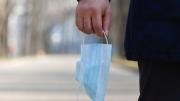The Harvard Community Council announced today that during the fall semester, 219 students were reported for violating community-health protocols. Among those students, 32 were removed from on-campus housing.
The council, a non-disciplinary body of College students, staff, and faculty members, received reports of 251 potential violations, with some students cited for multiple issues. The most common report (49 percent of total concerns) was a failure to complete “Crimson Clear,” the University app for reporting daily wellness checks. Additionally, 43 students were reported for hosting unauthorized gatherings (17 percent of concerns) and 20 were reported for attending one such gathering (8 percent). The remaining reports included students who violated testing or quarantine protocol, hosted guests, or did not wear masks.
The most common response to violations was a warning from the College’s Community Health Leads—tutors, proctors, or faculty-dean aides who advise students on health protocols. Of the 219 students reported, 125 received these warnings, and an additional 27 received warnings of other types. Twenty-eight received “community responses” (notifications of “serious violations” of health protocols). The most serious charge, removal from housing, was given to 32 students.
Those 32 students were required to leave campus, but Community Council co-chairs Meg Lockwood and Brett Flehinger emphasized that they were allowed to remain in their fall-semester classes (all of which were conducted remotely, whether students were on campus or living elsewhere). “Actions of the Council are not recorded on a student’s transcript,” the report stated, “nor are they reported out as part of a student’s disciplinary history with the College.”
The Council will remain active during the spring term, when current planning calls for a larger group of students—about half the undergraduate total—to be invited back on campus. The number who will be in residence when the semester begins, January 25, has not yet been disclosed.









